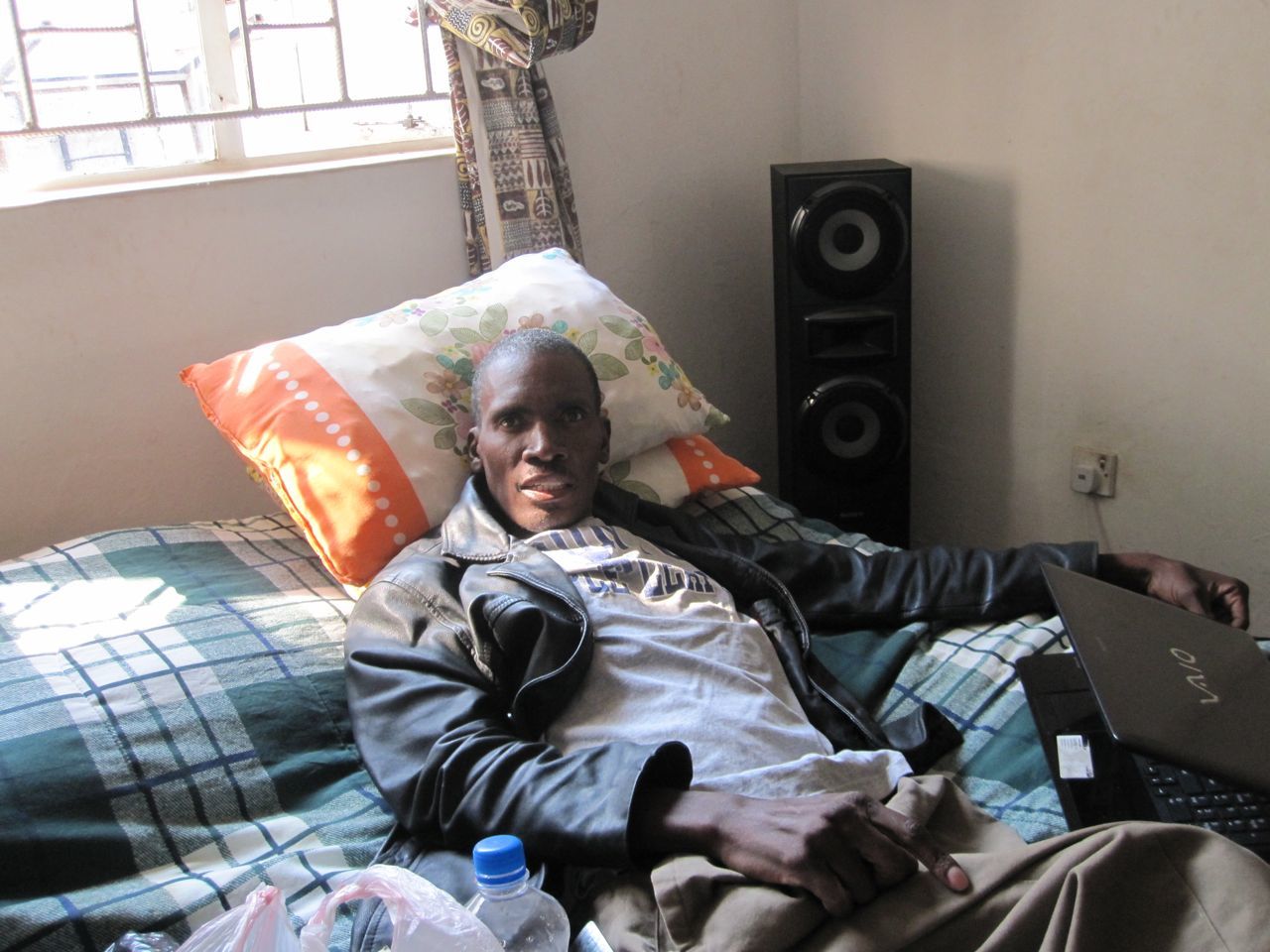There was a time, the nurse caring for him now says, when people didn’t believe Winstone Zulu was sick. That was back in the early 1990s, after he set a precedent here by declaring publicly that he was living with the virus that leads to AIDS.
“He looked so healthy,” Foster Chileshe said.
She didn’t know him then, but she knew of him. “He has been an icon in this country,” she said.
Now, more than 20 years since he was diagnosed with HIV, he had had a bad night. He pointed to a folder on the floor next to his bed—his medical file from Beth Israel Hospital in New York. The diagnosis: HIV enteropathy—a diagnosis of exclusion, he said, adding that meant no one knows what is causing it, or what to do about it.
He survived a childhood bout of polio and has used crutches to drag his atrophied legs around ever since. He survived tuberculosis while watching it kill four of his brothers. He has lived with HIV for 20 years. Now, it looks like chronic, unexplained diarrhea is going to do him in. He weighs about 100 pounds.
He thinks he is running out of time and he is worried that some of the history of the epidemic he has spent his adult life talking about will vanish with him.
“There is so much that people don’t talk about,” he said. “This is the cradle of fighting HIV in this country.” He lay limp, looking like he was dropped, dressed on top of the covers of his bed, pillows propping his head, his chin resting on his chest, his hand dangling over a half open laptop computer next to him. His brow and cheekbones stand out now, and his clothes look empty. He smiled.
“This used to be my bedroom 17 years ago,” he said.
He is staying at Hope House, a place he established soon after he was diagnosed in 1991, when he tested local tolerance by moving in with a group of men publicly living with HIV. It was, he said, “an experiment in stigma.” “They are all dead now,” he added.
Back then, they all looked healthy, and he wonders if that was part of why the neighbors stood for it. Then maybe, they weren’t seen as much of a threat here, in Villa Elizabetha, a modest nine-square block neighborhood of large plots and few people sandwiched between the dusty downtown of the nation’s capital and a light industrial zone of warehouses. And they wanted to find out if they could beat the stigma that was silencing talk of an epidemic moving like fire through the country.
“So we actually moved,” he said.
They moved to a crowded compound, where the neighbors lived inches apart and knew everything about each other. There, he said, the neighbors also learned to live with them.
“You know stigma is a very tricky thing,” he said. “It’s not that clear cut. We lived relatively better. We always had salt and sugar. People came to eat with us, off the same plate.”
Back then, though, when he and his group wrote to 130 businesses offering to come in and talk to workers about HIV, only seven answered.
“They didn’t want to deal with it. Now a business that didn’t have an HIV workplace policy would be stigmatized,” he said.
While he was criticized when he married and fathered children, with strides to prevent parent to child transmission, parenthood for people living with HIV has become widely accepted.
Other issues, the ones almost no one talks about, seem to have worsened, if anything, over time.
“The homophobia here is terrible,” he said. Homosexual sex is still illegal here, and an upcoming presidential election has led to daily charges in one of the government-owned newspapers that the candidate running against the ruling party would change that.
And as he wrote in a New York Times op-ed column recently, stereotypes remaining around disability have led people to ask how he became infected with HIV (the same way most people do, he said: through sex) and to neglect efforts to reach the disabled—whom he says are estimated to have HIV rates up to three times higher than others—with prevention messages.
Now he’s worried no one will be talking about any of those things.
He wrote the column in March, when he was in New York, where he wound up at Beth Israel Medical Center. The diagnosis of HIV enteropathy meant there was nothing more doctors could do for him, as far as he could see. When he got the diagnosis, he booked a seat on a flight back to Zambia the next day.
“I just gave up. They say it’s better to come back sitting on a plane seat than as cargo,” he said.
His hand hanging over the keyboard of his half-open laptop moved restlessly. Now an advocate for combined HIV and TB testing and treatment, he should be busy.
“Ever since I came back from the US I have been down,” he said. “I was invited to speak at the UN in May—I couldn’t travel. I was supposed to go to Seattle—they bought me a ticket—I couldn’t go. I was supposed to write a blog for AIDS Free World—I haven’t written one.”
Chileshe, his nurse, arrived to give him an infusion of intravenous fluids.
“All this delay, you are going to find me dead one day,” he said.
“He’s a joker,” Chileshe said the next day. “So you really don’t know if he’s discouraged. When he called, he said, I am sick. Come quickly or you will find me dead. I felt bad. When I came I said why did you say that? He said, I wanted you to come quickly.”
